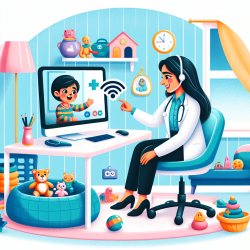Introduction
The COVID-19 pandemic has dramatically altered our daily routines, leading to increased screen time as schools and workplaces shifted online. A recent systematic review titled Unprecedented times and uncertain connections: A systematic review examining sleep problems and screentime during the COVID-19 pandemic explores the impact of this increased screen time on sleep, particularly in children. As practitioners focused on improving outcomes for children, understanding these findings can enhance our approach to online therapy and interventions.
Key Findings from the Research
The review analyzed 18 studies from around the world, examining the relationship between screen time and various sleep parameters during the pandemic. The findings suggest a negative impact of increased screen time on sleep, including:
- Increased sleep onset latency: More time spent on screens was associated with longer times to fall asleep.
- Delayed bedtimes: Screen time before bed contributed to later bedtimes, disrupting normal sleep schedules.
- Reduced sleep duration: Children and adults alike experienced shorter sleep durations with increased screen exposure.
- Altered wake times: Screen use before bed led to later wake times, further disrupting daily routines.
- Decreased sleep quality: Higher screen usage was linked to poorer sleep quality, impacting overall well-being.
Implications for Practitioners
As practitioners, these findings highlight the importance of addressing screen time in our therapeutic interventions. Here are some strategies to consider:
- Education and Awareness: Educate families about the impact of screen time on sleep and overall health. Encourage setting limits on screen usage, especially before bedtime.
- Incorporate Sleep Hygiene Practices: Integrate sleep hygiene education into therapy sessions, emphasizing the importance of consistent sleep schedules and screen-free time before bed.
- Use Data-Driven Approaches: Utilize data from sleep assessments to tailor interventions that address specific sleep-related issues in children.
- Collaborate with Families: Work closely with families to develop personalized plans that balance screen time with other activities promoting healthy sleep habits.
Encouraging Further Research
While the review provides valuable insights, it also indicates the need for further research to explore other factors influencing the relationship between screen time and sleep. Practitioners are encouraged to contribute to this body of research by:
- Conducting longitudinal studies to assess long-term effects of screen time on sleep.
- Exploring the impact of different types of screen content on sleep quality and duration.
- Investigating potential mediating factors, such as psychological well-being and lifestyle changes, that may influence sleep outcomes.
Conclusion
The intricate connection between screen time and sleep during the COVID-19 pandemic underscores the need for data-driven interventions in our practice. By understanding and addressing these factors, we can better support children and their families in achieving healthier sleep patterns and improved overall well-being.
To read the original research paper, please follow this link: Unprecedented times and uncertain connections: A systematic review examining sleep problems and screentime during the COVID-19 pandemic.










